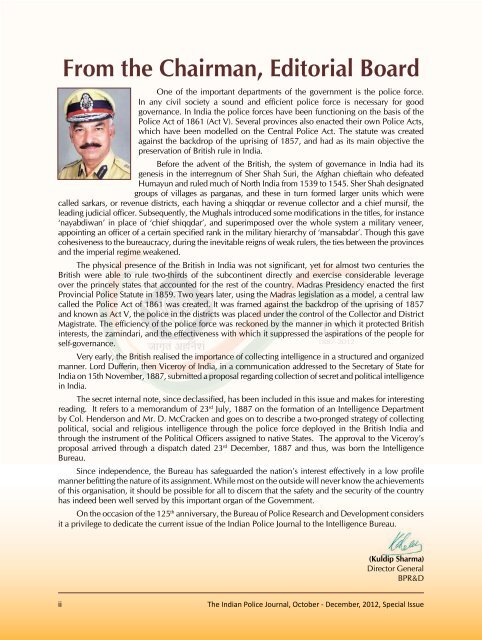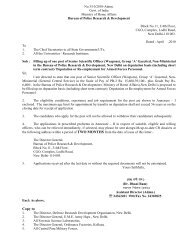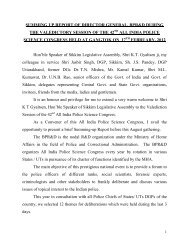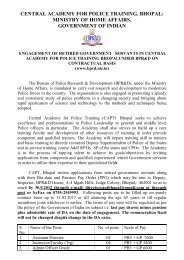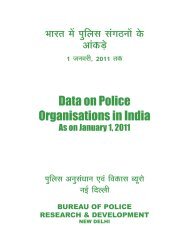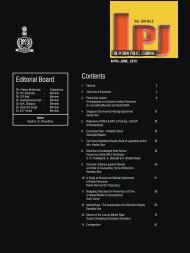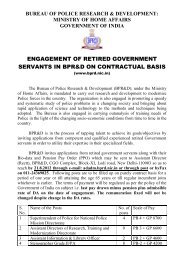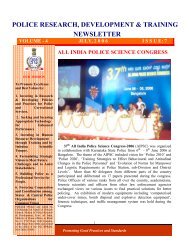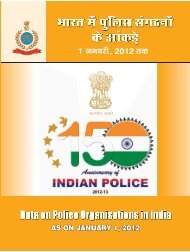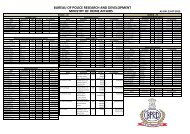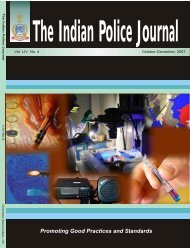Editorial Board Contents - Bureau of Police Research and ...
Editorial Board Contents - Bureau of Police Research and ...
Editorial Board Contents - Bureau of Police Research and ...
You also want an ePaper? Increase the reach of your titles
YUMPU automatically turns print PDFs into web optimized ePapers that Google loves.
From the Chairman, <strong>Editorial</strong> <strong>Board</strong>One <strong>of</strong> the important departments <strong>of</strong> the government is the police force.In any civil society a sound <strong>and</strong> efficient police force is necessary for goodgovernance. In India the police forces have been functioning on the basis <strong>of</strong> the<strong>Police</strong> Act <strong>of</strong> 1861 (Act V). Several provinces also enacted their own <strong>Police</strong> Acts,which have been modelled on the Central <strong>Police</strong> Act. The statute was createdagainst the backdrop <strong>of</strong> the uprising <strong>of</strong> 1857, <strong>and</strong> had as its main objective thepreservation <strong>of</strong> British rule in India.Before the advent <strong>of</strong> the British, the system <strong>of</strong> governance in India had itsgenesis in the interregnum <strong>of</strong> Sher Shah Suri, the Afghan chieftain who defeatedHumayun <strong>and</strong> ruled much <strong>of</strong> North India from 1539 to 1545. Sher Shah designatedgroups <strong>of</strong> villages as parganas, <strong>and</strong> these in turn formed larger units which werecalled sarkars, or revenue districts, each having a shiqqdar or revenue collector <strong>and</strong> a chief munsif, theleading judicial <strong>of</strong>ficer. Subsequently, the Mughals introduced some modifications in the titles, for instance‘nayabdiwan’ in place <strong>of</strong> ‘chief shiqqdar’, <strong>and</strong> superimposed over the whole system a military veneer,appointing an <strong>of</strong>ficer <strong>of</strong> a certain specified rank in the military hierarchy <strong>of</strong> ‘mansabdar’. Though this gavecohesiveness to the bureaucracy, during the inevitable reigns <strong>of</strong> weak rulers, the ties between the provinces<strong>and</strong> the imperial regime weakened.The physical presence <strong>of</strong> the British in India was not significant, yet for almost two centuries theBritish were able to rule two-thirds <strong>of</strong> the subcontinent directly <strong>and</strong> exercise considerable leverageover the princely states that accounted for the rest <strong>of</strong> the country. Madras Presidency enacted the firstProvincial <strong>Police</strong> Statute in 1859. Two years later, using the Madras legislation as a model, a central lawcalled the <strong>Police</strong> Act <strong>of</strong> 1861 was created. It was framed against the backdrop <strong>of</strong> the uprising <strong>of</strong> 1857<strong>and</strong> known as Act V, the police in the districts was placed under the control <strong>of</strong> the Collector <strong>and</strong> DistrictMagistrate. The efficiency <strong>of</strong> the police force was reckoned by the manner in which it protected Britishinterests, the zamindari, <strong>and</strong> the effectiveness with which it suppressed the aspirations <strong>of</strong> the people forself-governance.Very early, the British realised the importance <strong>of</strong> collecting intelligence in a structured <strong>and</strong> organizedmanner. Lord Dufferin, then Viceroy <strong>of</strong> India, in a communication addressed to the Secretary <strong>of</strong> State forIndia on 15th November, 1887, submitted a proposal regarding collection <strong>of</strong> secret <strong>and</strong> political intelligencein India.The secret internal note, since declassified, has been included in this issue <strong>and</strong> makes for interestingreading. It refers to a memor<strong>and</strong>um <strong>of</strong> 23 rd July, 1887 on the formation <strong>of</strong> an Intelligence Departmentby Col. Henderson <strong>and</strong> Mr. D. McCracken <strong>and</strong> goes on to describe a two-pronged strategy <strong>of</strong> collectingpolitical, social <strong>and</strong> religious intelligence through the police force deployed in the British India <strong>and</strong>through the instrument <strong>of</strong> the Political Officers assigned to native States. The approval to the Viceroy’sproposal arrived through a dispatch dated 23 rd December, 1887 <strong>and</strong> thus, was born the Intelligence<strong>Bureau</strong>.Since independence, the <strong>Bureau</strong> has safeguarded the nation’s interest effectively in a low pr<strong>of</strong>ilemanner befitting the nature <strong>of</strong> its assignment. While most on the outside will never know the achievements<strong>of</strong> this organisation, it should be possible for all to discern that the safety <strong>and</strong> the security <strong>of</strong> the countryhas indeed been well served by this important organ <strong>of</strong> the Government.On the occasion <strong>of</strong> the 125 th anniversary, the <strong>Bureau</strong> <strong>of</strong> <strong>Police</strong> <strong>Research</strong> <strong>and</strong> Development considersit a privilege to dedicate the current issue <strong>of</strong> the Indian <strong>Police</strong> Journal to the Intelligence <strong>Bureau</strong>.(Kuldip Sharma)Director GeneralBPR&DiiThe Indian <strong>Police</strong> Journal, October - December, 2012, Special Issue


